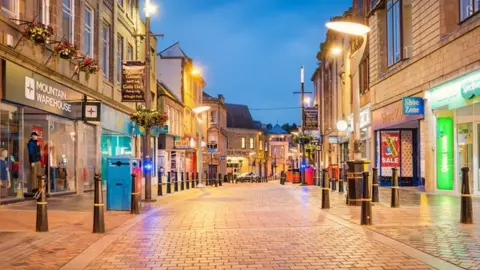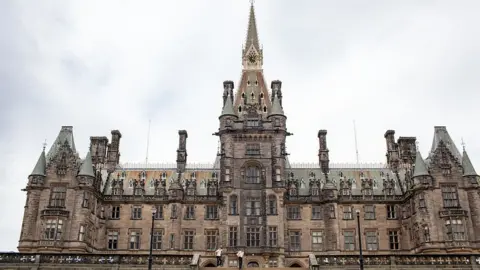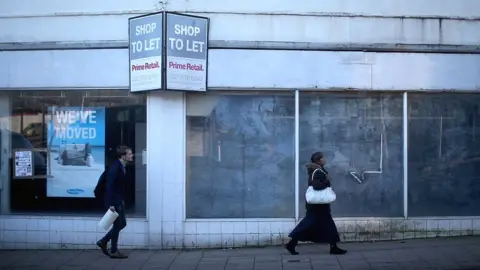Why did business rates become a battleground?
 Getty Images
Getty ImagesA battle has been raging at Holyrood as MSPs debated who controls nearly £3bn of tax revenue raised each year in business rates. A Scottish Green amendment to a Scottish Parliament bill wanted the power to set business rates to change hands from the Scottish government to local authorities.

What are business rates?
Unlike domestic homeowners, Scotland's businesses do not pay council tax. Instead, shops, warehouses, offices, pubs and hotels pay money to the Scottish government in business rates.
Every five years an independent assessment is carried out on every business property in Scotland to work out their "rateable value". This is a judgment of how much the property should cost to rent. It does not matter how much money a business makes or loses.
The Scottish government then sets an overall "poundage rate" which acts like a tax rate. The business rate bill is the rateable value multiplied by the poundage rate. Businesses can apply to reduce the bill through "relief" schemes.
Although the rate is set by the Scottish government, the money is collected by councils and is worth 22% of their revenue funding.
Why is there a battle over business rates now?
 Getty Images
Getty ImagesSome business groups dislike the inflexibility of business rates. In particular, retailers feel penalised for continuing to operate in town and city centres, paying a high share of business rates, while their online competitors have much lower bills.
The Non-Domestic Rates Bill was introduced to parliament following the Barclay review which made a series of recommendations on reform to business rates.
The bill includes moves to change revaluations from every five to three years and reforming the "clogged" appeals system.
It would also introduce a way of reducing bills for growing firms and remove "cliff edge" disincentives than can stop small firms expanding.
When the bill entered its committee stage in parliament, the majority of its MSPs backed the controversial change that would see fee-paying private schools no longer able to claim charitable relief from business rates.
But it was an amendment from Scottish Green MSP Andy Wightman that took people by surprise when it was accepted by the committee.
Mr Wightman's change sought to hand the power to set business rates from the Scottish government to local authorities.
What difference would it make?

In theory, it could result in 32 different business rates, one for each council area.
Some councils might put up the rate to generate extra cash to plug budget gaps, while others could use it to undercut neighbouring areas.
Mr Wightman's view was that local control existed until 1992 and it would be good for local accountability if it was brought back.
He cited the example of Highland Regional Council, which used to use its flexibility on business rates to help the fabrication yards at Nigg and Ardersier through peaks and troughs of work.
What does business think of the move?
 Getty Images
Getty ImagesBusiness lobby groups responded forcefully, saying they were profoundly concerned about the abolition of the uniform business rate and Scotland-wide reliefs.
They claimed the move would bring complexity, cost and unpredictability into system.
They were also worried it could lead to higher business rates bills, at a time when the poundage rate is already at a 20-year high.
Do councils want the power back?
Councils want more clarity about how it would work in practice.
Council umbrella group Cosla originally liked the look of the Wightman amendment, seeing it as an opportunity to progress towards greater fiscal power.
However, councils did not want the power without preparatory work to look at any implications.
What happened at the final stage in parliament?
At the committee stage, the amendment gained the support of Labour and Conservative MSPs.
The Scottish government was very keen to overturn it, saying it created huge uncertainties and unintended consequences for both ratepayers and Scottish councils.
It said that vital business rates relief for tens of thousands of small businesses would be abolished.
During the final debate on the bill, the Tories and Labour reversed their positions and no longer backed Andy Wightman's call.
The Tories said: "We do not believe this is the right time or that this bill is the right vehicle for this policy".
